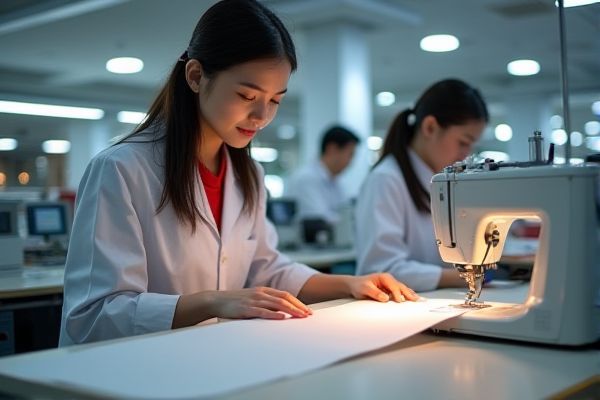
Vietnam's textile industry is experiencing significant growth, leading to numerous job opportunities for fabric technologists. Companies in fashion, apparel manufacturing, and technical textiles are actively seeking skilled professionals to enhance product quality and innovation. Positions often require expertise in fabric properties, testing methods, and production processes to ensure high standards and sustainability. Job seekers can explore openings through local recruitment agencies, online job portals, and industry-specific events to connect with potential employers.
Job Description
Fabric technologist jobs in Vietnam involve overseeing the development and production of textiles, ensuring that materials meet quality and performance standards. Roles typically require expertise in fabric properties, manufacturing processes, and trend analysis to align products with market demands. You will often collaborate with design teams, suppliers, and manufacturers to innovate and enhance fabric functionalities. A strong understanding of sustainability practices is increasingly important, as the textile industry in Vietnam prioritizes eco-friendly solutions to meet global standards.
Requirement
Fabric technologist jobs in Vietnam require a strong understanding of textile science and material properties. Candidates should possess a degree in textile engineering or a related field, along with practical experience in fabric development and testing. Familiarity with local manufacturing processes and sustainability practices in the Vietnamese textile industry is highly valued. Proficiency in English and effective communication skills can enhance your opportunities for collaboration with international clients and suppliers.
Salary and Perks Expected
Fabric technologist jobs in Vietnam typically offer a competitive salary ranging from 10 to 20 million VND per month, depending on experience and expertise. Professionals in this field may also receive additional perks, such as health insurance, performance bonuses, and opportunities for career advancement. The growing textile and garment industry in Vietnam creates a high demand for skilled technologists who can contribute to quality control and innovation in fabric production. You can enhance your career prospects by staying updated on industry trends and acquiring relevant certifications.
Similar Job Names
- Fabric Technologist
- Textile Engineer
- Quality Control Analyst
- Fabric Development Specialist
- Textile Testing Technician
- Product Development Manager
- Fabric Research Scientist
- Textile Production Manager
- Technical Sales Representative
- Dyeing and Finishing Specialist
- Merchandising Manager
- Fabric Procurement Officer
- Garment Technologist
- Apparel Quality Assurance Manager
- Process Improvement Specialist
Job Expectation Concept
A fabric technologist in Vietnam is expected to have a deep understanding of textile materials, production processes, and quality control measures tailored to the local market. Job responsibilities include analyzing fabric properties, ensuring compliance with industry standards, and collaborating with manufacturers to enhance product quality. Continuous learning about the latest textile innovations and sustainable practices is crucial for staying competitive in the Vietnamese market. Your ability to communicate effectively with suppliers and clients will also play a significant role in achieving successful project outcomes.
Career Advantage and Weakness
Fabric technologists in Vietnam benefit from the country's rapidly expanding textile and garment industry, which contributes significantly to the national economy. With a strong emphasis on innovation and quality, your role involves collaborating with manufacturers to ensure the proper selection and use of materials, enhancing product durability and aesthetic appeal. Challenges include navigating fluctuating demand and competition from low-cost international producers, which can affect job stability and growth opportunities. Continuous training and staying updated with global trends are essential for overcoming these weaknesses and advancing in this dynamic field.
Important Thing Must Know
The role of a fabric technologist in Vietnam involves a strong understanding of textile materials and their properties, crucial for meeting industry standards. Your responsibilities may include testing fabric quality, optimizing production processes, and collaborating with design teams to create innovative textile solutions. With Vietnam emerging as a key player in global textile manufacturing, opportunities in this field are expanding rapidly, particularly in major cities like Ho Chi Minh City and Hanoi. Awareness of local and international market trends can significantly enhance your effectiveness in this position. Continuous professional development and networking within the industry can also provide valuable insights and potential career advancement.
Alternative Career Options
Fabric technologists in Vietnam can explore various career options beyond traditional roles in textile manufacturing. Opportunities exist in sectors such as fashion design, where your expertise in fabrics can enhance clothing collections and sustainability practices. Additionally, positions in quality control and testing laboratories allow for the application of technical knowledge to ensure product standards. Consulting or starting your own textile business can also leverage the growing demand for innovative fabric technologies and eco-friendly materials in the local market.
Companies List
- Garment Manufacturing Companies (e.g., Vinatex, Tal Apparel)
- Textile Mills (e.g., Dong Bang Fiber, Thai Tuan)
- Fashion Retail Brands (e.g., NEM Fashion, May 10)
- Apparel Exporters (e.g., Ftex, Viet Tien)
- Sportswear Companies (e.g., Nike, Adidas)
- Home Textiles Manufacturers (e.g., Hanvico, Cosequin)
- Technical Textile Producers (e.g., Vinatex, Dinh Vu Textile)
- Sustainable Fashion Brands (e.g., Re-born, Cuong Vina)
- Footwear Manufacturers (e.g., Pou Chen, Chang Shin)
- Leather Goods Producers (e.g., Ky Hoa, Binh Tien)
List of Ideal City
Hanoi offers a rich tapestry of opportunities for fabric technologists, with a growing textile industry and numerous garment factories. Ho Chi Minh City is another vibrant hub, known for its innovative fashion scene and access to top-tier production facilities. Da Nang, with its emerging business landscape, is increasingly attracting companies seeking skilled fabric technologists. Your expertise could greatly contribute to the dynamic developments within Vietnam's textile sector, enhancing both local and international market presence.
 jobs-vietnam.com
jobs-vietnam.com